Madame Matilda’s Midwinter Maladies – OR – Holiday Hazards and How to Avoid Them
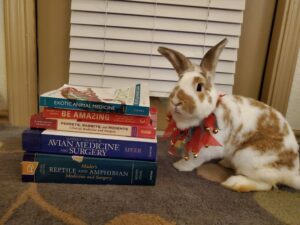
‘Tis the season for bringing trees indoors, inviting strangers in, and cooking all sorts of traditional concoctions. It can be a bewildering time for animal companions everywhere. Some of the things that are brought in can be dangerous to us! As a veteran holiday handler, let me hop you through it.
Chocolate Catastrophes
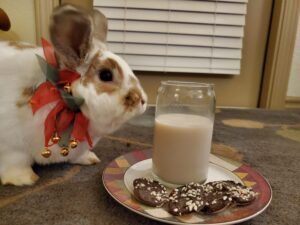
Chocolate, or more specifically the theobromine and caffeine that it contains, is toxic to numerous animal species. The darker the chocolate, the higher the concentration of these molecules. Other potentially harmful components of chocolate include sugar (which can cause gastrointestinal imbalance) and fats (which can be irritating to the pancreas and GI tract).
Methylxanthines like theobromine and caffeine have a general stimulatory effect on both cardiac and skeletal muscle. They also increase the circulation of epinephrine and norepinephrine. Humans can break down methylxanthines, which is why they need to go for another cup of coffee. However, many animals are unable to eliminate these compounds leading to a long acting, potentially fatal caffeine (and theobromine) high.
Clinical signs of chocolate toxicity include panting, hyperactivity/restlessness, increased thirst and urination, vomiting, diarrhea, and incoordination. Severe toxicosis can cause seizures, tachycardia, hyperthermia, coma, and cardiac arrest.
Most cases of chocolate toxicity can be managed with medical decontamination and supportive care.
Ominous Odors
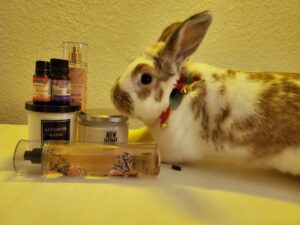
Many animals are sensitive to particulates and aerosols that make up the fragrances humans use and gift to each other. These can be very irritating and even cause inflammation. Stuffy noses, sneezing, and a cough can be noted in mild cases. More severe ones can lead to increased respiratory effort, thickening and discharge from the airways, and distress. Our feathered friends are especially at risk due to their highly efficient respiratory system. Birds have a one-way respiratory tract consisting of their lungs and air sacs. While this is excellent for absorbing oxygen, it is also more surface area for particulates and aerosols to bind and cause a problem.
Cooking Calamities
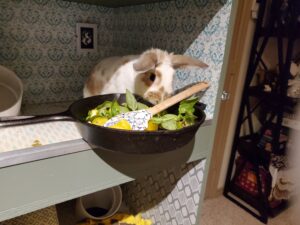
The kitchen can be a dangerous place on the best of days. Hot appliances, popping oil, feet to be under… but during the holidays that danger is compounded by the many many many (maybe too many) cooks in the kitchen. Animal companions should be kept out of an active kitchen to prevent burns, scalds, and other trauma.
Teflon is a HUGE danger to birds. This non-stick surface can be found on cookware, irons, ironing boards, self-cleaning ovens, heating lamps and more. When this compound burns, it releases polytetrafluoroethylene gas. This gas does not produce an odor detectable to humans. Once inhaled by a bird, this gas causes hemorrhage of the lungs. Outwardly you may see difficulty breathing, incoordination, collapse, seizures, and occasionally acute death. Birds exposed to polytetrafluoroethylene gas require aggressive supportive care and oxygen therapy.
Floral Fatalities

As we don’t have time for a semester of botanical toxicology, here’s a quick rundown of festive toxic plants and what they can cause:
- Amaryllis: abdominal pain, gastrointestinal upset, hypersalivation, tremors, loss of appetite
- Holly: gastrointestinal upset, depression/decreased appetite
- Mistletoe: gastrointestinal upset, hypotension, low heart rate, difficulty breathing
- Poinsettia: irritating to mucous membranes, causes hypersalivation and vomiting
- For more information on toxic plants, check out the ASPCA Pet Poison Control’s list: https://www.aspca.org/pet-care/animal-poison-control/toxic-and-non-toxic-plants
Acrimonious Alcohol
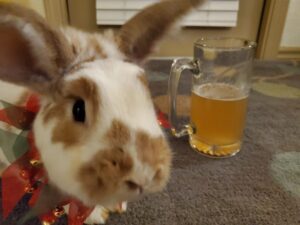
While your humans are making merry, stay away from the Schnapps! Alcohol is rapidly absorbed via the gastrointestinal tract and sometimes the skin. With the small body size of most animal companions, we can hit alcohol poisoning levels quickly. Within an hour these animals may be hypersalivating, vomiting, and develop disorientation and stumbling. In severe intoxication animals may have low blood sugar and body temperature, difficulty breathing, low heart rate, and fall into a coma. Treatment involves fluid therapy and supportive care (ranging from heat support to ventilation).
Vile Voltage
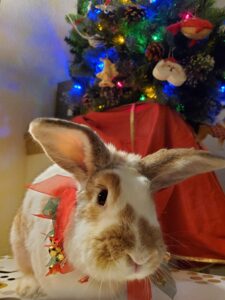
For reasons unknown to myself and my caretaker, I love to chew on electrical cords. Maybe it’s the mouth feel or the zappy flavor… Either way, it’s a horrible idea. Electrocution can cause local trauma to the mouth like burns and ulcerations as well as systemic signs like fluid buildup in the lungs, seizures, hypersensitivity to touch, disorientation, paraplegia, and death in some cases. But I just can’t help myself! That’s probably why all of the cords in my house are covered or hidden…
Sinister Stressors
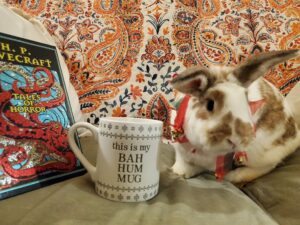
Crowds, strangers, loud noises. Holidays can be stressful, especially for those of us with heightened senses (do you see the size of my ears??). Be very cognizant of your companion’s comfort level in new situations. Stress can cause behavioral changes, decreased appetite, and even lead to illness! If your animal friend is shy or anxious, give them a quiet place to retreat and do not force them to interact. If you have a more outgoing companion, make sure that your guests know how to safely handle them.
In summary:
|
|
|
|
|
|
|
|
|
|
|
|
|
I hope that these reminders help you all stay safe and sane this holiday season!
Sincerely,
Mme Matilda Munyon
If you suspect that your animal companion has been exposed to a hazard or toxin, please contact your veterinarian immediately!! Do not attempt to make your pet vomit at home as this can lead to aspiration pneumonia, stomach ulcers, and occasionally cardiac arrest. Some animals are unable to vomit (rabbits and rodents especially) and attempting to make them do so may result in the rupture of their stomach. Vomiting should only be induced under veterinary supervision for your pet’s safety.

About Us
Our exotic animal hospital is dedicated exclusively to the care of birds, exotic small mammals, reptiles, and even fish! We can offer everything your pet needs for a healthy and happy life, from wellness care and grooming to diagnostics and dentistry, but we can also provide emergency care during our opening hours, along with more specialized treatment for referred patients.
